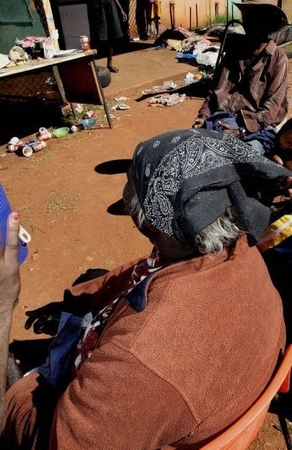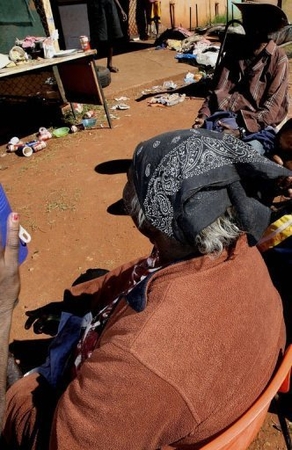Australian mining boom leaves Aboriginal town behind
AFP | 13.04.2010 04:58 | Anti-racism
ROEBOURNE, Australia (AFP) - - The windows of Roebourne's once-thriving main street have been boarded up and its pavement is littered with the shards of shattered beer bottles.
Aboriginal elder Peter Jeffries gestures a weathered hand toward the abandoned banks and offices in the Western Australian town, their peeling facades bleached by the desert sun.


Originally settled in the late 18th century gold rush, Roebourne was reduced to a virtual ghost town in the 1960s, when mining giants Rio Tinto and BHP Billiton developed the towns of Karratha and Dampier to accommodate their workers.
Farmers forced the local Ngarluma and Yindjibarndi tribes off the land and Aboriginal people were banned from entering Roebourne at all until the late 1960s, when it was reclaimed as a native township following the miners' exodus.
Today it sits just 40 kilometres (25 miles) from Australia's lucrative iron ore mines, but wealth and progress have passed the people of Roebourne by.
"In the last 20 years we've seen zero benefits," says local mine worker Vince Adams.
"The houses have slowly degenerated to nothing, they live in faeces. You go to any one of the houses in this community and you will find 15, 20 adults living in a three bedroom house. Alcohol, sexual, drug, child abuse, we've got the whole lot."
"We are either alcoholics or drug addicts, and a minority of us work," he adds, with a bitter laugh.
Adams' two-year-old nephew died last year after touching live wires which had been exposed by a hole in the wall of his family's rundown house during a game of hide and seek.
The toddler's family can only afford the rent by sharing the house with almost a dozen other families.
Plumbing and other infrastructure is stretched to the limit and disease is rife. Children quite literally sleep where they can find space, and live in highly dysfunctional environments, Adams says.
The town's 50-year-old school is in a state of disrepair and there is no doctor or X-ray machine at the local hospital.
Men live, on average, to just 52 years of age in Roebourne and women 63, compared with the national average life expectancy of 79 years for men and 84 for women.
"Indigenous people are still living in third-world conditions, they are still dying faster, their education rate is still lower than the rest of Australia. We die more often from curable disease," Jeffries said.
Optimism prevailed in the 1980s when mining companies promised local tribes a share of profits in return for using land, but a 2005 study of Aboriginal living conditions in the Pilbara found many deals had brought little benefit.
The indigenous employment rate is roughly half that of the wider Pilbara community and their participation in the booming mining sector has remained relatively marginal, while the cost of living has skyrocketed.
They account for just five percent of income earned in the region -- three percent of mainstream earnings -- despite making up more than 15 percent of the population.
As much as 36 percent of the Aboriginal population is dependent on welfare.
"As an Aboriginal person you're better off on welfare in public housing, that's the reality, because the economy has gone crazy," said Simon Hawkins, chief of the Yamatji Marlpa Aboriginal Corporation (YMAC).
The very act of mining is anathema to Aborigines' deep connection to and belief in origin from the land, but they are powerless to stop it, explains Hawkins, who mediates between local tribes and mining companies.
"There's no land rights legislation in Western Australia, mining will occur," he said. "It's a matter for the traditional owners of trying to negotiate the best terms that they can."
The highly confidential terms of land use agreements vary widely from compensation in the form of a lump sum or royalties, to training programmes or job guarantees.
But mining companies enjoyed 40 years of unadulterated profits before laws were passed requiring them to recognise Aboriginal claims over the land, during which time YMAC estimates 340 billion dollars of iron ore was exported to Asia.
Of the 16 billion dollars in mining profits made in 2008 Hawkins said less than 0.25 percent went back to Aborigines, while more than 35 percent of future production would come from mines not covered by land use agreements.
Jeffries, who represents the local Aboriginal people in contract negotiations, blames pervasive ignorance for their continuing plight.
"The wider community will never understand the connection that indigenous people have to our country. (The miners) only give us what they have to legally and it means absolutely nothing," he said.
"They take, take, take and they don't give back, and they use the excuse that they're just here to take the stuff out of the ground, but it goes bigger than that."
Unease about potential loss of culture was identified in the 2005 study by the Australian National University as one of the difficulties for Aborigines in engaging with the mining industry, and Adams says companies have been slow to appreciate their needs.
Some firms now include "cultural leave" in their contracts with Aboriginal workers to accommodate ceremonies marking births, initiations and funerals, but most are forced to forget their traditions, he says.
"It affects the people who are trying to carry on our law and culture, our whole community," he said, noting the particular impact of lengthy stints in mines on their complex kinship-based family system.
AFP